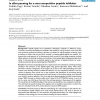Free Online Productivity Tools
i2Speak
i2Symbol
i2OCR
iTex2Img
iWeb2Print
iWeb2Shot
i2Type
iPdf2Split
iPdf2Merge
i2Bopomofo
i2Arabic
i2Style
i2Image
i2PDF
iLatex2Rtf
Sci2ools
BMCBI
2007
2007
In silico panning for a non-competitive peptide inhibitor
Background: Peptide ligands have tremendous therapeutic potential as efficacious drugs. Currently, more than 40 peptides are available in the market for a drug. However, since costly and time-consuming synthesis procedures represent a problem for high-throughput screening, novel procedures to reduce the time and labor involved in screening peptide ligands are required. We propose the novel approach of 'in silico panning' which consists of a two-stage screening, involving affinity selection by docking simulation and evolution of the peptide ligand using genetic algorithms (GAs). In silico panning was successfully applied to the selection of peptide inhibitor for watersoluble quinoprotein glucose dehydrogenase (PQQGDH). Results: The evolution of peptide ligands for a target enzyme was achieved by combining a docking simulation with evolution of the peptide ligand using genetic algorithms (GAs), which mimic Darwinian evolution. Designation of the target area as next to the subs...
BMCBI 2007 | Ligand | Peptide | Peptide Ligands |
| Added | 09 Dec 2010 |
| Updated | 09 Dec 2010 |
| Type | Journal |
| Year | 2007 |
| Where | BMCBI |
| Authors | Yukiko Yagi, Kotaro Terada, Takahisa Noma, Kazunori Ikebukuro, Koji Sode |
Comments (0)

